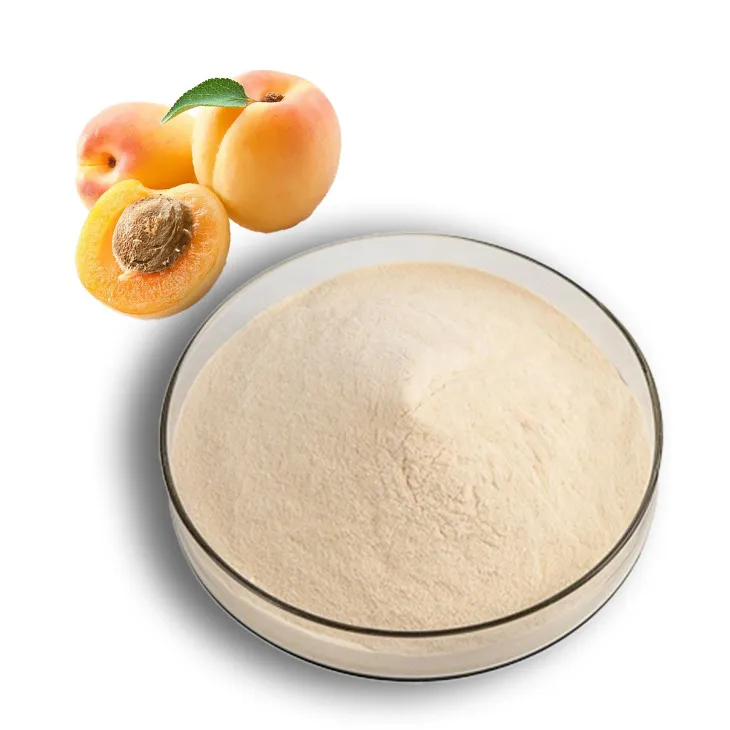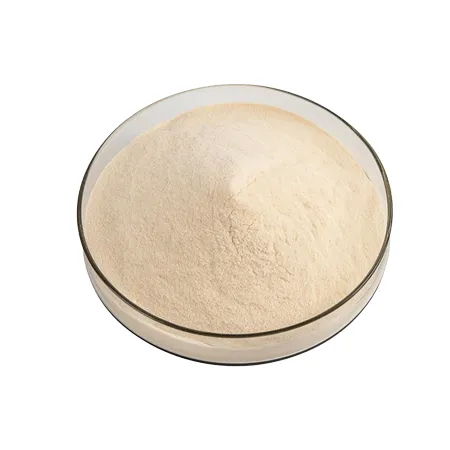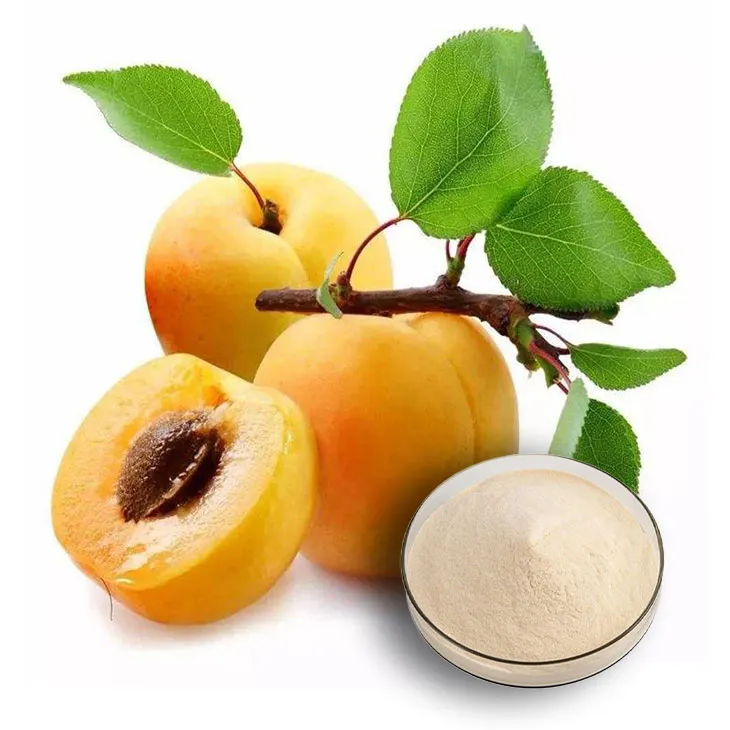- 0086-571-85302990
- sales@greenskybio.com
Is apricot powder beneficial for diabetes? Are these all safe and suitable for diabetic patients?
2024-11-12

1. Introduction
Diabetes has emerged as one of the most common and challenging health problems globally. With the increasing prevalence, diabetic patients are constantly on the lookout for natural products that could potentially assist in managing their condition. Apricot Powder has recently gained some attention in this regard. However, it is crucial to thoroughly investigate whether it is truly beneficial for diabetes and if it is safe for those with this condition.

2. Nutritional Components of Apricot Powder
Apricot Powder is rich in several nutrients that could potentially have an impact on diabetes management.
2.1 Vitamins
Apricots are a good source of vitamins, especially vitamin A and vitamin C. Vitamin A is essential for maintaining good vision, which is often affected in diabetic patients due to microvascular complications. Vitamin C, on the other hand, is an antioxidant. It helps in protecting cells from oxidative stress, which is increased in diabetes. Oxidative stress can lead to further damage to the pancreas, blood vessels, and other organs. By reducing oxidative stress, vitamin C in apricot powder might play a role in diabetes management.
2.2 Minerals
Apricot powder contains minerals such as potassium. Adequate potassium levels are important for maintaining normal heart function and blood pressure. In diabetic patients, there is often an increased risk of hypertension and heart disease. Potassium in apricot powder may contribute to better cardiovascular health, which is an important aspect of overall diabetes management.
2.3 Fiber
Fiber is another important component of apricot powder. Soluble fiber, in particular, can slow down the absorption of carbohydrates in the gut. This leads to a more gradual rise in blood sugar levels after a meal. For diabetic patients, controlling post - meal blood sugar spikes is crucial. By consuming apricot powder rich in fiber, they may be able to better manage their blood sugar levels.

3. Impact on Blood Sugar Regulation
The potential impact of apricot powder on blood sugar regulation is a key aspect to consider for diabetic patients.
3.1 Glycemic Index
The glycemic index (GI) of a food indicates how quickly it raises blood sugar levels. Foods with a low GI are generally more favorable for diabetic patients as they cause a slower and more gradual increase in blood glucose. While there is no specific research on the GI of apricot powder alone, apricots themselves have a relatively low GI compared to many other fruits. This suggests that apricot powder may also have a relatively mild effect on blood sugar levels, potentially making it a suitable addition to the diet of diabetic patients.
3.2 Insulin Sensitivity
Some of the nutrients in apricot powder, such as certain antioxidants and fiber, may improve insulin sensitivity. Insulin sensitivity refers to how effectively cells respond to insulin. In diabetes, especially type 2 diabetes, there is often a problem with insulin resistance, where cells do not respond properly to insulin. If apricot powder can enhance insulin sensitivity, it could help diabetic patients better regulate their blood sugar levels. For example, the fiber in apricot powder may promote the growth of beneficial gut bacteria, which in turn can influence insulin sensitivity.

4. Safety Considerations for Diabetic Patients
While apricot powder may have potential benefits, it is also important to consider its safety for diabetic patients.
4.1 Sugar Content
One concern is the sugar content in apricot powder. Although apricots are a natural source of sugars, if the powder is highly concentrated, it could potentially contain a significant amount of sugars. Diabetic patients need to be cautious about their overall sugar intake to avoid excessive spikes in blood sugar levels. It is important to check the label for the sugar content and, if possible, choose apricot powder with a lower sugar concentration or use it in moderation.
4.2 Allergies
Some individuals may be allergic to apricots. Allergic reactions can range from mild symptoms such as itching and hives to more severe reactions like difficulty breathing and anaphylaxis. Diabetic patients with apricot allergies should obviously avoid apricot powder to prevent allergic reactions, which could further complicate their health status.
4.3 Interaction with Medications
Another important safety aspect is the potential interaction of apricot powder with diabetes medications. Some components in apricot powder may interact with medications used to control blood sugar, such as insulin or oral hypoglycemic agents. For example, if apricot powder enhances the effect of these medications too much, it could lead to hypoglycemia (low blood sugar). Diabetic patients should consult their healthcare providers before adding apricot powder to their diet to ensure that there are no adverse interactions.
5. Incorporating Apricot Powder into the Diet
If apricot powder is deemed suitable for a diabetic patient, there are several ways to incorporate it into the diet.
5.1 Smoothies
One popular way is to add apricot powder to smoothies. A diabetic - friendly smoothie could be made with apricot powder, low - glycemic index fruits like berries, unsweetened almond milk, and a source of protein such as Greek yogurt or protein powder. This provides a nutritious and potentially blood - sugar - friendly meal or snack option.
5.2 Baking
Apricot powder can also be used in baking. However, when using it in baked goods, it is important to adjust the other ingredients to ensure that the overall carbohydrate and sugar content remains within a suitable range for diabetic patients. For example, whole - wheat flour can be used instead of refined flour, and natural sweeteners with a lower glycemic impact can be substituted for regular sugar.
5.3 Oatmeal and Cereal
Adding apricot powder to oatmeal or cereal can enhance the flavor and nutritional value. It can be combined with other fiber - rich foods to create a filling and blood - sugar - regulating breakfast option. Diabetic patients should be careful to measure the amount of apricot powder added to avoid excessive calorie and sugar intake.
6. Conclusion
Apricot powder has several potential benefits for diabetes management due to its nutritional components such as vitamins, minerals, and fiber, which may have positive effects on blood sugar regulation and overall health. However, diabetic patients need to be cautious about its safety aspects, including sugar content, allergies, and potential interactions with medications. Before incorporating apricot powder into their diet, it is advisable for diabetic patients to consult their healthcare providers. By carefully considering both the potential benefits and risks, diabetic patients can make an informed decision about whether apricot powder is a suitable addition to their diabetes management plan.
FAQ:
Question 1: What are the main nutritional components in apricot powder?
Apricot powder typically contains various nutrients. It has vitamins such as vitamin A, which is important for eye health and immune function. It also contains dietary fiber that can aid in digestion. Additionally, it may have some minerals like potassium which is beneficial for heart and muscle function. However, the exact composition can vary depending on the source and processing of the apricot powder.
Question 2: How might apricot powder affect blood sugar regulation?
The dietary fiber in apricot powder can slow down the digestion and absorption of carbohydrates. This may lead to a more gradual increase in blood sugar levels rather than a sharp spike. However, apricot powder also contains natural sugars, and if consumed in large amounts, it could potentially raise blood sugar levels. Diabetic patients need to be cautious about the quantity consumed and monitor their blood sugar closely when adding apricot powder to their diet.
Question 3: Is apricot powder safe for all diabetic patients?
Not necessarily. While apricot powder may offer some potential benefits, individual responses can vary. Some diabetic patients may have allergies or sensitivities to apricot. Also, those with certain medical conditions in addition to diabetes, such as kidney problems, may need to be more careful as the potassium content in apricot powder could be a concern. It is always advisable for diabetic patients to consult their healthcare provider before consuming apricot powder.
Question 4: Can apricot powder replace diabetes medications?
No. Apricot powder is not a substitute for diabetes medications. Medications are specifically designed to control blood sugar levels, and they are based on scientific research and clinical trials. While apricot powder may have some positive effects on blood sugar regulation and overall health, it cannot replace the role of prescribed medications. Diabetic patients should continue to take their medications as directed by their doctor and use apricot powder as a complementary addition to their diet if deemed appropriate.
Question 5: How much apricot powder can a diabetic patient consume safely?
There is no one - size - fits - all answer. It depends on various factors such as the individual's overall diet, blood sugar control, and other health conditions. Generally, starting with a small amount, such as a teaspoon or two per day, and monitoring blood sugar levels is a good approach. If blood sugar remains stable, the amount may be adjusted gradually under the guidance of a healthcare provider.
Related literature
- The Role of Nutritional Supplements in Diabetes Management"
- "Effects of Dietary Fibre on Blood Glucose in Diabetic Patients"
- "Safety Considerations of Natural Food Products in Diabetes"
- ▶ Hesperidin
- ▶ Citrus Bioflavonoids
- ▶ Plant Extract
- ▶ lycopene
- ▶ Diosmin
- ▶ Grape seed extract
- ▶ Sea buckthorn Juice Powder
- ▶ Fruit Juice Powder
- ▶ Hops Extract
- ▶ Artichoke Extract
- ▶ Mushroom extract
- ▶ Astaxanthin
- ▶ Green Tea Extract
- ▶ Curcumin
- ▶ Horse Chestnut Extract
- ▶ Other Product
- ▶ Boswellia Serrata Extract
- ▶ Resveratrol
- ▶ Marigold Extract
- ▶ Grape Leaf Extract
- ▶ New Product
- ▶ Aminolevulinic acid
- ▶ Cranberry Extract
- ▶ Red Yeast Rice
- ▶ Red Wine Extract
-
Black Rice Extract
2024-11-12
-
Citrus Aurantium Extract
2024-11-12
-
Marigold Extract
2024-11-12
-
Bitter Melon Extract
2024-11-12
-
Red Vine Extract
2024-11-12
-
Maca Extract
2024-11-12
-
Cranberry Extract
2024-11-12
-
Jujube Extract
2024-11-12
-
Honeysuckle Pollen
2024-11-12
-
Moringa powder
2024-11-12





















